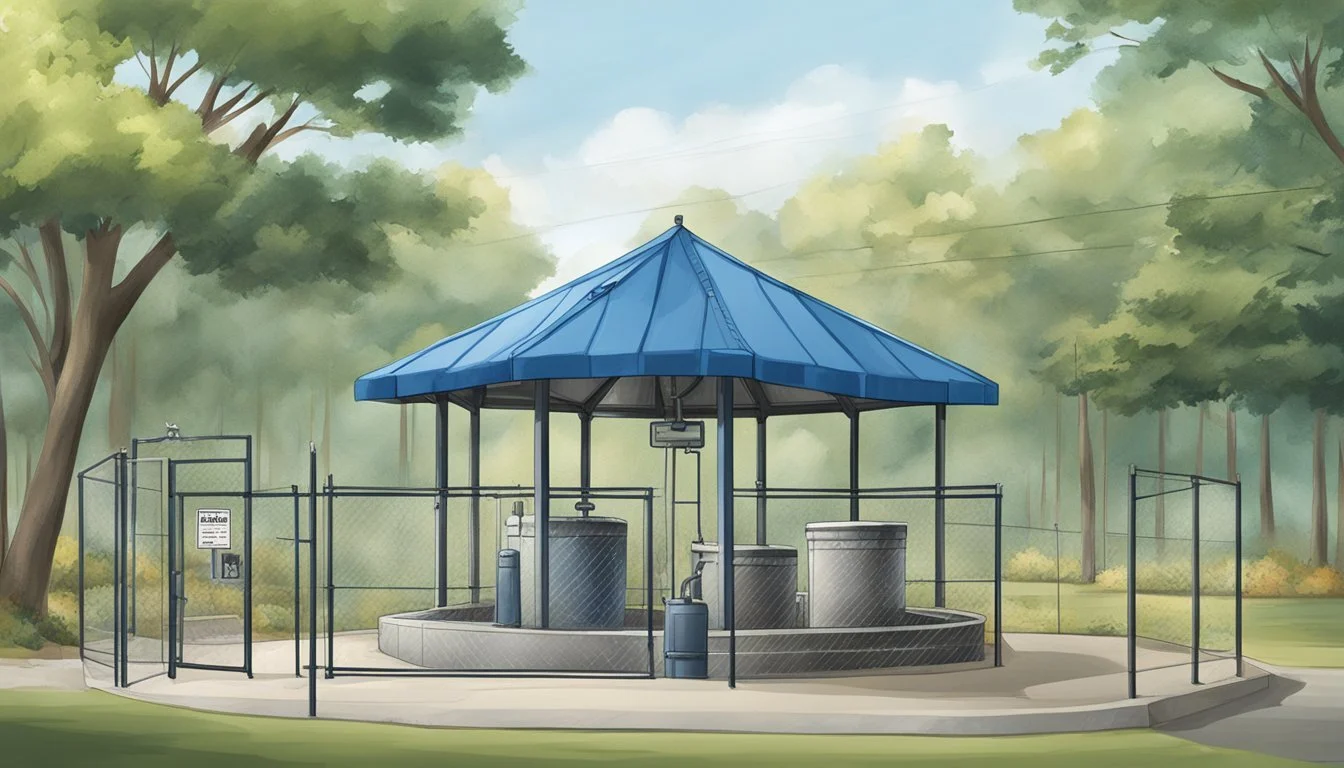North Carolina Water Well Regulations
Understanding Compliance and Safety Standards
Water quality in North Carolina is a subject of paramount importance, not only to public health but also to the environmental integrity of the state. To manage and protect this vital resource, North Carolina has established a comprehensive set of regulations governing the construction, maintenance, and abandonment of water wells. These rules are designed to prevent contamination of groundwater sources, thus ensuring that both public and private water systems provide safe and reliable drinking water to residents across the state.
The North Carolina Environmental Management Commission, through the guidelines provided by the North Carolina Well Construction Act, mandates that all wells meet specific construction and location standards. These regulations balance the needs of water users with the need to safeguard the state's groundwater from pollutants, a key aspect of maintaining a sustainable water supply. With the cooperation of regional offices and collaboration with local health departments, North Carolina aims to promote the well-being of its citizens, the health of its environment, and the integrity of its water systems.
Legal Framework and State Regulations
The legal framework surrounding North Carolina's water well regulations is a complex structure that involves state-specific statutes and a variety of governing agencies. These regulations ensure the safe construction, operation, and maintenance of water wells within the state.
North Carolina Well Construction Standards
North Carolina has established specific construction standards for water wells to safeguard public health and the groundwater resources. The state's construction requirements are detailed in the Rules Governing Public Water Systems, which provide comprehensive standards for site investigation, design, and construction practices. These standards are enforced by the Department of Environmental Quality (DEQ) and are applicable to all new and modified water well systems.
Legislation and Governing Agencies
Legislation detailing the responsibilities of various governing agencies is crucial for water well regulation. The Department of Health and Human Services (DHHS), more specifically the On-Site Water Protection Branch, along with the DEQ and local health departments, collaborate to implement and enforce the regulations. Together, these agencies play a pivotal role in managing the state's ground water through legislative and regulatory frameworks, including the statutes found in the North Carolina General Statutes Article 10.
Permitting Process and Permit Fees
Before constructing or modifying a water well in North Carolina, individuals must obtain the necessary permits. The permitting process involves submitting a detailed application to the appropriate local or state agency. As part of this process, applicants are required to pay permit fees, which vary based on the type and depth of the well. The fees contribute to the cost of reviewing the application, as well as to the ongoing management of water resources.
Inspection and Testing Requirements
After a well is constructed, it must undergo rigorous inspection and testing to ensure it meets all state standards. The water quality and system integrity are evaluated by authorized representatives of the DEQ and local health departments, and the results of these tests determine if the well is fit for use. Regular testing of water wells is mandated to monitor for contaminants and maintain compliance with EPA guidelines and state regulations.
Water Well Construction and Maintenance
Water well regulations in North Carolina require strict adherence to proper construction, regular maintenance, and responsible abandonment, ensuring safe water sources and environmental protection.
Planning and Construction
In North Carolina, well contractors must follow the Well Contractor Certification Rules to ensure that water wells are constructed to the highest standards. Planning involves assessing site-specific hydrogeological conditions and selecting materials that meet the Well Construction Standards for Water Supply. A permit is required for any water supply well with a design capacity of 100,000 gallons per day or greater.
Wellhead Protection and Maintenance
The wellhead is the structure at the surface of the well that provides direct access to the well interior. It is crucial for preventing contaminants from entering the water supply. Proper wellhead construction, coupled with routine maintenance, is vital for the longevity and safety of the water well. Wellhead protection involves regular inspection and sanitization to avert potential contamination.
Repairs and Well Abandonment
When a well is no longer in use or fails to meet the required standards, well abandonment procedures must be followed. Abandonment requires a professional approach to ensure that the old well does not become a conduit for surface contaminants. The North Carolina Department of Environmental Quality (DEQ) provides guidance on proper abandonment techniques. If a well requires repairs, licensed well contractors must carry out the necessary services following the state's well construction and repair guidelines.
Water Quality and Testing
In North Carolina, private drinking water wells are prevalent and their management is crucial. Water quality standards are established to safeguard health, and testing for contaminants like iron, lead, and other minerals is both a safety measure and a regulatory requirement.
Water Quality Standards and Testing
North Carolina's water quality standards are designed to protect public health. These standards regulate the presence of minerals, iron, lead, and other contaminants in water. It is essential that private well water conforms to state-specific standards to ensure safety for consumption and use. Regular testing is employed to assess the water's compliance with these standards and maintain its quality.
Contaminant Management
When levels of certain contaminants exceed health-based standards, intervention is required to manage these contaminants. They may advise on treatment options to remove or reduce the presence of harmful contaminants such as iron which, although a common mineral in the earth's crust, can be problematic at high concentrations.
Private Well Water Testing
Owners of private drinking water wells in North Carolina are responsible for ensuring their water's safety. Testing must be done on newly constructed wells and periodically thereafter to maintain accuracy in detecting any hazardous levels of lead, iron, or other contaminants. This proactive approach is critical in preventing any potential health risks associated with private well water consumption.
Private Wells and Public Water Systems
In North Carolina, regulations for private wells and public water systems are distinct yet equally important for ensuring the safety and reliability of drinking water. The state sets clear mandates for the operation of both, tailored to protect public health through rigorous standards and oversight.
Managing Private Drinking Water Wells
Private wells fall under the purview of localized oversight, with emphasis on safe construction, location, and water quality. Private well owners are incentivized to comply with regulations that mandate testing and adherence to construction standards. For example, well construction forms guide the permissible techniques and materials to be used, ensuring the sustainability of the groundwater resources. Additionally, comprehensive sampling programs administered by local health departments, as indicated in the Private Well Information, demand newly constructed private wells be tested for a suite of contaminants to secure safe drinking water.
Governing Public Water Systems and Services
Public water systems, on the other hand, are stringently regulated through rules that pertain to their source, treatment, and distribution. The Rules Governing Public Water Systems, often referred to as the Green Book, sets the framework within which public water systems must operate. This includes definitions, source location regulations, and guidelines for submitting plans and specifications for new systems or changes to existing ones. Public water services extend beyond mere provision to encompass ongoing customer service needs, where water providers are obligated to meet the demands of the population through consistent and clear communication, maintaining infrastructure, and emergency responsiveness.
Education, Outreach, and Resources
North Carolina demonstrates a proactive approach in offering educational materials and financial support, aimed at efficient water resources management. Programs and guidance resources are tailored to foster community participation and awareness.
Educational Resources and Events
The N.C. Division of Water Resources provides a wealth of educational resources to promote understanding of water regulations. They host events designed to train technical staff and inform the public about responsible water use.
Upcoming Events:
Water Efficiency Workshops
Regulatory Compliance Seminars
Grants and Funding for Water Resources Management
Financial resources for water efficiency education and outreach programs are crucial. Grants may be available to support such initiatives, ensuring that both the technical staff and consumers are well-equipped to collaborate on water conservation efforts.
Funding Opportunities:
Community Water Infrastructure Funds
Water Resources Development Grants
Compliance and Additional Resources
In North Carolina, water well regulations are stringent to ensure public safety and sustainable resource management. Entities involved in water well construction and maintenance must adhere to an established framework that encompasses compliance procedures and mandates additional testing and studies to maintain water quality standards.
Compliance and Enforcement
The North Carolina Department of Environmental Quality is responsible for enforcing water well regulations. They ensure that all water wells within the state meet the criteria set forth in Title 15A of the North Carolina Administrative Codes. Water well professionals are required to follow specific well construction standards, such as the proper location and construction materials to be used, as well as protocols for repair and abandonment of wells. Enforcement actions are taken against non-compliant parties which can include fines and other legal measures.
Additional Testing and Studies
In addition to compliance, regular testing of water wells is crucial for monitoring contaminants and overall water quality. The Division of Water Resources regularly conducts studies to evaluate the environmental impact of water projects and provides technical assistance for water systems planning development. When private wells exceed drinking water standards, the local health department collaborates with DHHS to inform well owners of the contaminants present and advise on steps to protect users' health. These actions underscore the importance of ongoing research and water quality monitoring in safeguarding North Carolina's water resources.
Technical Aspects of Well Systems
Technical considerations are integral to the function and sustainability of well systems. Engineers and environmental specialists pay close attention to well capacity, pump mechanics, and groundwater interactions to ensure a reliable water supply.
Understanding Well Capacity and Pump Mechanics
The capacity of a well is determined by the volume of water it can supply over a set period, often measured in gallons per minute (gpm). This capacity relies on the tank size and the pump design. Pumps must be engineered to match the well's production rate, ensuring that the groundwater can replenish the supply without over-extraction. For example, in North Carolina, the design and operation of water well systems must comply with specific Well Construction Standards.
Pump Mechanics: The pump is the heart of the well system, exerting pressure to transport water from the well to the tank. It's designed to handle the:
Rated Capacity: Expected performance under designated conditions.
Maximum Capacity: The greatest flow achievable without causing damage.
Maintenance is essential to the pump's longevity, requiring periodic checks and servicing to prevent malfunctions that can lead to water shortages or quality issues.
Groundwater and Surface Water Interaction
Groundwater and surface water are interconnected resources, often influencing each other's quantity and quality. Well systems must be situated and constructed to protect against contamination from surface activities and to honor stream classifications which designate waterbody uses and standards. Proper site investigation is vital to determine if a well is viable and to assess potential impacts on the waters of the state, as outlined by the NC Division of Water Resources.
Interaction Points:
Recharge Areas: Locations where surface water can percolate and replenish groundwater stores.
Discharge Areas: Places where groundwater emerges as springs or seeps, often feeding into streams and lakes.
They must analyze hydrogeological data to understand the dynamic interactions and mitigate risks of depletion or pollution. The construction and maintenance of wells thus require a sophisticated understanding of these complex systems.
Frequently Asked Questions
North Carolina has specific regulations concerning the placement, construction, and maintenance of private water wells to ensure public health and environmental safety.
What are the minimum distance requirements for water well placement from structures in North Carolina?
In North Carolina, private wells must be placed at a minimum distance from structures to avoid contamination. This includes distance from septic tanks, other sources of pollution, and property lines.
What constitutes the legal framework for well construction standards in North Carolina?
The legal framework for well construction standards in North Carolina is defined by North Carolina General Statute 87-97. It mandates counties to establish programs for the permitting, inspecting, and testing of private wells.
Are there specific certification requirements for contractors installing private wells in North Carolina?
Yes, contractors installing private wells in North Carolina must be certified. The certification ensures they are knowledgeable about the state's construction standards for water supply and other types of wells.
What are the regulations governing water quality testing for private wells in North Carolina?
Regulations for water quality testing require that new private wells undergo testing for various contaminants to ensure the water is safe for consumption. The local health department provides guidance if contaminants exceed safe levels.
How do shared well agreements operate under North Carolina law?
Shared well agreements in North Carolina are legally binding documents that dictate the use, maintenance, and funding of a shared private water well by multiple parties.
Where can I access the North Carolina water well database for information on my area?
Information on private wells in a specific area can be found in the North Carolina water well database, managed by the Department of Environmental Quality.










